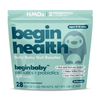3 Ways to Boost a Formula-Fed Baby’s Microbiome
share this article

Supporting Gut Health from Day One
Your baby’s microbiome, the collection of beneficial bacteria that live in the gut plays a critical role in immune development, digestion, and long-term health. While breastfeeding naturally delivers important microbes and prebiotics, formula-fed babies can still build a healthy, balanced gut with a few key strategies.
Here are three science-backed ways to support the microbiome in formula-fed babies right from the start.
1. Add Prebiotics That Mimic Breast Milk
Breast milk contains special prebiotics called Human Milk Oligosaccharides (HMOs), which feed good bacteria like Bifidobacterium infantis. HMOs help shape a microbiome that’s rich in beneficial bacteria, lower in pathogens, and supportive of immune development.
The good news? Certain infant formulas now include bioidentical HMOs, most commonly 2’-fucosyllactose (2’-FL). For additional support, you can use a prebiotic supplement like Beginbaby Prebiotic + Probiotic, which contains:
-
2’-FL HMO to mimic the benefits of breast milk
-
Chicory root inulin, another gentle prebiotic fiber
Together, these ingredients help feed the good bugs your baby already has and encourage a microbiome closer to that of breastfed infants [1].
2. Supplement with Targeted Infant Probiotics
Probiotics introduce helpful live bacteria to your baby’s gut, especially strains that are commonly found in breastfed infants. One of the most studied strains for babies is Bifidobacterium infantis, which helps:
-
Promote regular, soft stools
-
Protect against harmful bacteria
-
Support immune function and gut lining health
Probiotics are especially useful for:
-
Formula-fed infants
-
Babies born via C-section
-
Babies exposed to antibiotics (prenatally or postnatally)
Look for a supplement designed for infants, ideally one that combines B. infantis and B. lactis—like the blend found in Beginbaby Prebiotic + Probiotics. These strains work synergistically with HMOs to promote a balanced, baby-friendly gut.
3. Minimize Disruptors and Promote Skin-to-Skin
Your baby’s microbiome doesn’t just come from the bottle, it also comes from you and the environment around them. Formula-fed babies can still be colonized with beneficial bacteria through daily contact and reduced disruption of microbial balance.
Tips to support a healthy microbiome environment:
-
Encourage skin-to-skin contact regularly to transfer your healthy bacteria
-
Limit unnecessary antibiotics, which can wipe out both good and bad bacteria
-
Avoid over-sanitizing—while hygiene matters, some exposure to household microbes is beneficial
-
Use microbiome-friendly supplements early, especially in the first 100 days of life when gut development is most dynamic
Summary
Even if your baby isn’t breastfed, you can still help shape a strong, resilient microbiome. Adding HMOs and prebiotics, introducing targeted probiotics, and maintaining daily contact and gentle care practices all support a healthier gut from the very beginning. With consistent support, formula-fed babies can build a thriving microbiome that sets them up for better digestion, immunity, and long-term wellness.
















